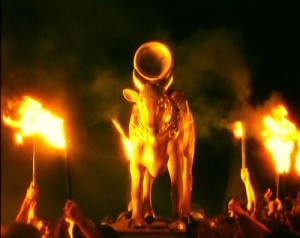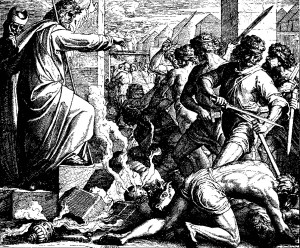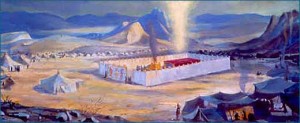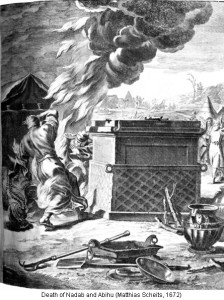Moses was a great, but reluctant leader. Born to Hebrew slaves, he was raised in the royal courts of Pharaoh. When tasked by G-d to lead his people up out of Egypt and to advance towards their destiny, he made excuses.
On the one side, Moses was “the most modest of men”, and yet was guided by a strong moral compass. When he finally acted, he inspired greatness in others.
On the other, these twelve tribes had a well-deserved reputation as ”a stiff-necked people”, with a propensity to retributive violence and passion. They also had an unique ethical tradition centered about one, incorporeal, unlimited, god. A loving, mysterious, and jealous god.
Any earthly leader of these people had to be, even if he had to be pushed into it, strong-willed to the point of ruthlessness.
These sons of Abraham and Sarah had been freed from nearly three hundred years of bondage in a pagan land.
They had seen miracles wrought on their behalf, over and over, to break the will of Pharaoh. They saw Egypt’s finest soldiers swept away in the Sea.
They complained and were given an oasis of water and dates to ease their travels. They had been fed with quail and manna in the desert. They were protected by day by a pillar of cloud and by night by a pillar of fire.
They had been attacked by Amalek and, despite ignoring G-d, and thereby delaying their response, had defended themselves, with at least partial success.
They had spent forty days refining themselves to receive the Torah at Sinai, and came directly before the Creator, to learn how to serve him, and thus how to teach the World by example.
First and foremost, they learned that He was G-d. He was One. There was no other. Period.
In all this we witness the birth of a Nation like no other, with a destiny like no other.
Yet a mere forty days later, many of these same people had turned their back to G-d.
While Moses was receiving instruction from G-d, and the Tablets of the Law were fashioned, an idol of gold had been fashioned and sacrificed to, and many were preparing to return to Egypt in an orgy of debasement.
Still, Moses pleads with G-d that they not be utterly destroyed. G-d relented, leaving Moses to resolve this rebellion.
Moses destroyed the Golden Calf, grinding it fine dust, and scattering it upon the water. The people drank of the water in a trial and judgment for their sin.
He rebuked Aaron for his weakness in allowing the people to prevail upon him in returning to idolatry. Finally, Moses called to those of the people who still were loyal to G-d to come to him.
Seeing those who still were immersed in sin before G-d, Moses ordered Levite warriors to cut down some three thousand rebels in their midst. In so doing, the Levites, having proved their integrity, above tribal or familial loyalty, became ordained as priests to G-d, until the End of Days.
At Sinai, G-d had (figuratively) taken the Israelites as his beloved, much like a wife. He revealed himself in ways unique to their bond. He plots a course with her for their life together. A great adventure. He placed himself directly at her guard, forgiving slights, providing for everything and destroying those who threaten her.
Then, barely through the honeymoon, G-d finds his bride has turned away and sought out others… former suitors, and a path of debasement. He withdrew, still in love, but deeply betrayed. He hid his essence away once again.
The next morning Moses told the assembled Israelites that he would again plead with G-d to spare those remaining. Moses told G-d that if what had been done was not enough, that if G-d still intended to destroy these people and start over, that he, Moses should be blotted out, as well.
G-d responded that “I will erase from my book whoever has sinned against Me.” G-d then struck the people with a plague to drive the point home.
He also told Moses that from here on an angel would go ahead of the people, rather than G-d’s own “Presence” (the Shechinah), the pillar of cloud in the day and the pillar of fire in the night that had thus far guided and protected the Israelites in the desert.
Moses informed the people of the departure of the Shechinah from their before their encampment. The people, realizing the severity of their betrayal mourned and feared its loss.
Moses then moved his tent about one thousand yards away from the others, and referred to it as the “Tent of Meeting”. The Shechinah then returned and rested above the Tent of Meeting, signifying when it did, that G-d was meeting with Moses. The Israelites, seeing this, did not dare approach, but rather bowed down from the entrances of their own tents.
Moses asked G-d to reconsider his distancing from the people. G-d responds by expressly prohibiting idolatry again, and details a series of specific commandments binding on the Israelites.
God instructed Moses to carve a second set of Tablets to replace those Moses had broken in fury and despair. God then affirmed that he would resume being slow to anger, and quick to forgiveness, towards the people.
Over the next forty days and forty nights on the mountain, G-d reiterated his Covenant with the Israelites to Moses, in detail.
G-d declared that he will drive the current inhabitants of the land promised to Abraham and his descendants (Amorites, Cana’anites, Chitites, Perizites, Chivites, and Jebusites) out of this land for the entering Israelites.
G-d warned Moses against the Israelites making any agreements with the prior inhabitants, nor mixing with them. All altars and monuments to their false gods were to be destroyed. The Israelites were to take possession of, and dwell in, this land, as people apart.
At Moses’ instruction a beautiful Tabernacle was constructed to serve as a portable “resting place” for G-d as the Israelites prepared to enter and secure their land. Elaborate and precise orders of sacrifices and services were established.
Aaron and his family, as a subset of the Levites became ordained into a priesthood to conduct these services correctly. The remaining Levites are tasked to support them in their duties. The Tabernacle is erected and the Shechina now rests there.
Soon thereafter, two of Aaron’s sons, Nadav and Avihu, deviated from these precise orders, and bringing “extraneous” fire “each in their own pan”, not as commanded by G-d, were instantly themselves consumed by fire. Such was the dangerous power of this Tabernacle and that which “rested” there.
All in all, six hundred thirteen mitzvot, specifically binding on this new Nation, were taught to the people at Sinai, in critical preparation for their great mission; to be a light unto the Seventy Nations of Mankind.
Each of the twelve tribes was given duties and well trained in their execution. This rabble of miraculously freed Hebrew slaves was being crafted into a well-oiled and sophisticated machine.
The town of Kadesh Barne’a; the mountainous gateway to the Land of the Edomites, was only eleven days march from Mount Sinai. Just beyond that lay their goal.





What a wonderful column! There is so much good to digest in here. G-d can make leaders out of unlikely people, and even if they lack attributes of a leader, he can guide them to become and do, what is necessary. This is a great column on many levels, I have some people that will really appreciate my sharing it. I appreciate you writing it!
Thank you.